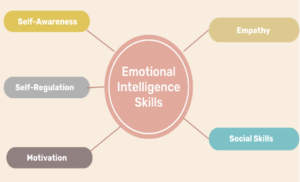Emotional Intelligence Skills: 5 Components of EQ
Emotional intelligence (EQ), often called “people skills” has become a key focus in personal development and corporate training, where ongoing learning and growth are highly valued. We’re always seeking effective ways to reach our goals and build meaningful relationships. While IQ measures our ability to learn, process, and recall information, emotional intelligence involves recognizing and managing our own emotions, as well as understanding and positively influencing the emotions of others. Those with higher emotional intelligence tend to excel in leadership and communication. In this post, we’ll explore the five components of emotional intelligence and how strengthening these skills can help you advance in life.

1. Self-Awareness
Understanding Yourself
Self-awareness is the ability to recognize and understand your own emotions, thoughts, and behaviors. It involves being mindful of how your feelings impact your actions and how others perceive you. With self-awareness, you can identify your strengths, weaknesses, and triggers, allowing you to make more informed decisions and manage your responses in different situations. This foundational skill is essential for personal growth, effective communication, and emotional intelligence.
Key Aspects of Self-Awareness:
Emotional Recognition: Recognize your emotions as they arise, such as noticing when you’re feeling frustrated or anxious, so you can manage those feelings before they escalate.
Self-reflection: Periodically reflecting on your reactions and decisions allows you to notice what emotionally impacts you and how you respond to these stressors.
Accurate Self-Assessment: By knowing your strengths and weaknesses, you can better capitalize on your strengths and find paths to improvement in the areas where you are weaker.
How to Improve Self-Awareness:
Practice Mindfulness: Meditation, deep breathing, or other mindfulness exercises can help you notice your feelings and thoughts.
Please Write in a Journal: Any time you notice an emotion, write about what it is and what you think it’s about. Over time, you’ll see patterns in how your emotions fluctuate.
Ask for Feedback: Ask friends, family, or trusted colleagues at the workplace for honest feedback on how you come across and the impact you have on others.
2. Self-Regulation
Managing Your Emotions
Self-regulation is the ability to manage your emotions and reactions in different situations. It involves staying calm under pressure, controlling impulsive responses, and responding thoughtfully rather than reacting instinctively. By practicing self-regulation, you can navigate challenging situations more effectively, maintain better relationships, and make more rational decisions.
Key Aspects of Self-Regulation:
Impulse Control: The ability to pause and avoid reacting impulsively to a trigger key. For example, taking a deep breath before responding to someone’s comment can help prevent an argument from escalating.
Emotional Stability: The ability to stay calm under stress and think before you react.
Adaptability: Flexibility and openness to change; the ability to cope with unexpected challenges and the emotions that come with them.
How to Improve Self-Regulation:
Take a Deep Breath: Pause before your reaction to a situation that sets off an emotional response.
Practice Stress Management: Identify activities that help you cope with stress, such as exercise, meditation, or hobbies that help you unwind.
Problem-solve: Notice the problem, then focus on how you will take steps to resolve it rather than continuing to rehash the problem itself. This will help you stay calm and engaged.

3. Motivation
Driving Yourself Forward
Motivation is the inner drive that pushes you toward achieving your goals and overcoming challenges. It keeps you focused, determined, and committed to your personal and professional growth. Whether it’s fueled by a desire for success, self-improvement, or passion for what you do, motivation helps you stay resilient in the face of obstacles and maintain a positive attitude.
Key Aspects of Motivation:
Achievement Orientation: A strong drive for achievement. The desire to do your best and be the best. Strive for success.
Commitment: Staying committed to your goals, even when faced with obstacles or setbacks.
Initiative: The ability to take action in order to make things happen; the tendency to act quickly and effectively.
Intrinsic Drive: Motivation that comes from personal satisfaction or passion.
Resilience: Ability to stay determined despite challenges or setbacks.
Positive mindset: Maintaining optimism and enthusiasm to keep moving forward.
Self-discipline: Staying focused and avoiding distractions.
Purpose: A clear sense of why you’re pursuing a goal, which fuels your efforts.
How to Improve Motivation:
Set Specific Goals: Set a specific, measurable, achievable, relevant, and timely goal.
Celebrate Small Wins: Find a way to celebrate your achievements throughout the journey.
Stay Positive: Cultivate a positive attitude, often referred to by psychologists as an “optimistic explanatory style.” This focuses on your strengths and successes, while also learning from your mistakes and failures.

4. Empathy
Understanding Others
Empathy involves putting yourself in someone else’s shoes to understand their feelings, thoughts, and experiences. It goes beyond just hearing their words; it requires you to connect with their emotions and perspective. By practicing empathy, you can build stronger relationships, communicate more effectively, and offer genuine support. This deeper understanding helps bridge gaps, resolve conflicts, and create a more compassionate and connected environment.
Key Aspects of Empathy:
Emotional Awareness of Others: The ability to notice and make sense of the feelings of others. This includes attending to and interpreting non-verbal cues, such as body language, tone of voice, and facial expression.
Perspective-taking: Seeing the world through another person’s eyes and trying to empathize with their perspective.
Compassionate Response: Giving support to others, especially when they are going through a tough time or experiencing pain.
How to Improve Empathy:
Practice Active Listening: Give your attention to what someone is saying without interrupting or judging. Use nodding, maintain eye contact, and offer responses to show that you are actively listening.
Reframe: Actively redefine your reaction to a situation or event by thinking of it from the perspective of someone you like. For each of these rules, we provided an example:
- Rule 1: I have different reactions to my wife and my coworkers; I get irritated with my coworkers because I never take the time to let off steam properly.
- Rule 2: When my father acts in a way I find frustrating, I often become furious and snap at him. I used to focus only on my own feelings without considering what might be in his best interest.
- Rule 3: It’s difficult for me to do this, but I try to think about the situation from his perspective.
- Rule 4: I try to envision his feelings when I see him get angry or lose his temper.
- Rule 5: It’s difficult, but when I see him suffer from pain, I try to think about what’s best for him, and it eases my irritation.
Overall, we saw the rules as practical guidelines for improving relationships. We believed that the man would likely have developed most of them if he had reflected on his experiences with his father. Understanding the rules this way, we could see how anyone could benefit from them, as they are designed to address the everyday challenges of managing difficult family members or friends.
Be Curious and Open: Have a genuine interest in other people by asking questions and learning about their experiences and feelings.

5. Social Skills
Building Strong Relationships
Social skills are the last part of emotional intelligence. They involve the ability to get along with others. Social skills involve how you communicate, compete, and collaborate with others, resolve conflict, and lead others. Strong social skills enable you to build and maintain healthy relationships, work with others, and lead teams.
Key Aspects of Social Skills:
Communication: Communication is the skill of expressing your ideas clearly and concisely and being able to listen to others. This includes both verbal and non-verbal communication.
Conflict Resolution: The capacity to handle and resolve disagreements productively, whereby all parties feel heard and respected.
Leadership and Influence: Ability to inspire, motivate, and lead by example, fostering high performance through a constructive team environment.
How to Improve Social Skills:
Practice Clear Communication: Speak clearly, and concisely and listen actively to make sure you understand someone’s perspective.
Develop a Repertoire of Conflict-Resolution Skills: Focus on developing skills for conflict resolution, like finding common ground, making compromises, and staying calm during disagreements.
Connect with Others: Make an effort to meet new people regularly, whether at networking events, over meals with coworkers, or while chatting with your neighbors.
Conclusion
With the right approach, mastering your emotions can become one of the most important skills for enhancing both your personal and professional life. By developing the five key components of emotional intelligence (EQ)—self-awareness, self-regulation, motivation, empathy, and social skills—you can gain better control over your emotions, improve your understanding of others, and build strong, productive relationships. Investing in your EQ not only enhances your leadership and communication skills but also deepens your understanding of your own emotions, paving the way for future success and satisfaction.

